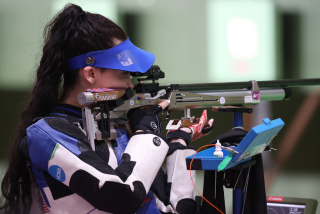ASIA : Japan Learning U.S. Language of Violence : Fatal shooting of exchange student in Louisiana prompts crash course in terms such as ‘Freeze!’
- Share via
TOKYO — A new President has been elected in America. New allegations of political corruption are cropping up in Tokyo. World trade talks are unraveling in Geneva. Yet a dispatch from Louisiana commanded much of the media attention here this week.
Rodney Peairs, 30, of Baton Rouge, was indicted on a charge of manslaughter after fatally shooting a 16-year-old Japanese exchange student who knocked on the wrong door while looking for a Halloween party. The youth, Yoshihiro Hattori, apparently did not understand Peairs’ command, “Freeze!” and when he moved he was fatally shot.
For the record:
11:17 a.m. Aug. 24, 2023An earlier version of this article mistakenly identified the gunman as Ronald Peairs. He was Rodney Peairs.
While a mistaken shooting might not touch off a string of headlines in the United States, the incident and its aftermath have been closely charted and endlessly dissected by the Japanese media. More than an isolated shooting, the Halloween incident has been magnified into a symbol of the sharp cultural differences between the two nations in language, attitudes toward weapons and the balancing act between personal freedom and public safety.
The incident has also reinforced Japanese images of “the sickness of American society, the cowboy spirit where people shoot at random,” said Ken Joseph, director of the Japan Helpline, a crisis center helping Japanese abroad and foreigners in Japan.
“What Americans don’t realize is how people in Japan live totally without any sense of danger. This society isn’t free, but it’s safe,” he said. “But Japanese need to realize how unusual Japan is.”
America has twice the population of Japan, but its incidence of handgun homicides is 70 times higher, according to figures here. America’s overall per capita crime rate is four times higher. In Japan, women can walk along dark streets at night without fear.
As a result, most Japanese could not comprehend why a resident of a relatively quiet neighborhood in Baton Rouge would pull a gun on an unarmed 16-year-old boy knocking on the door.
But they are learning why--quickly.
Since the incident, the public has been deluged with information about “the dark side of U.S. culture,” as a recent article in the daily Yomiuri newspaper put it. Several articles have offered crash courses in “survival English,”--or, as the Mainichi newspaper’s Sunday magazine described it, “Words you’ll get killed by if you don’t know.” “Hold it,” “Halt,” “Stick ‘em up” and “Don’t move a muscle” were among the phrases explained to Japanese readers.
A three-day seminar in Tokyo this week instructed nearly 400 Japanese headed overseas how to deal with dangerous situations, including physical demonstrations of how to raise one’s hands in the air if told to “Stick ‘em up.” The Japan News Network even sent a reporter to New York and hired a local street tough to demonstrate how he and others often target Japanese by bumping into them, dropping a wine bottle and demanding payment for it.
The Japanese find it difficult to understand why a citizen such as Peairs would even own a gun, underscoring sharp differences in national attitudes toward weapons.
American colonists won their independence from British rulers with arms and enshrined the right to bear arms in the Constitution, and their descendants uphold the individual’s right to self-defense. But the Japanese, with the exception of the samurai class, were disarmed by Shogun Hideyoshi Toyotomi more than 400 years ago, and possession of handguns is strictly prohibited even today.
Guns are so alien to most Japanese, according to Joseph, that one man, confronted by a gun-toting stranger in San Francisco, laughed and said, “What’s that?” He was shot in the foot.
And many Japanese were flabbergasted to hear that Peairs was not immediately jailed after the shooting, since authorities here rarely grant bail. Hideyuki Kayanuma, a criminal lawyer, said Japan does not have as many gradations of culpability as America and that a similar incident in Japan would likely be regarded as murder, since the very act of shooting would establish intent.
Despite the grand jury’s decision to indict on the lesser charge of manslaughter, reaction here has been temperate. TV networks told viewers the manslaughter charge was “relatively harsh.” Hattori’s parents thanked the “common sense of the American people” for not letting Peairs go free.
More to Read
Sign up for Essential California
The most important California stories and recommendations in your inbox every morning.
You may occasionally receive promotional content from the Los Angeles Times.














